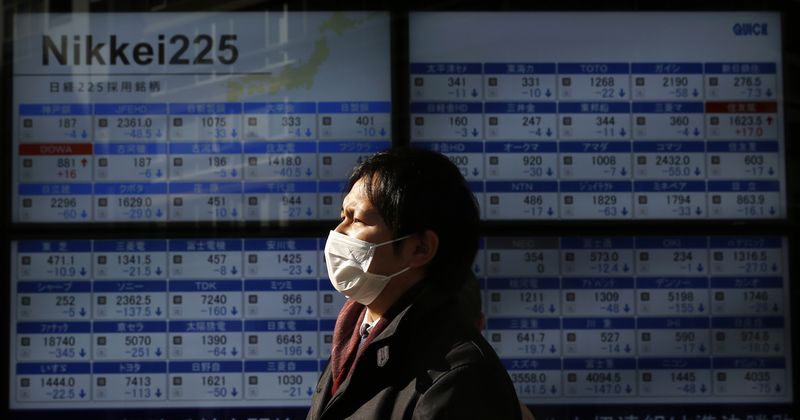
- All Instrument Types
- Indices
- Equities
- ETFs
- Funds
- Commodities
- Currencies
- Crypto
- Bonds
- Certificates
Please try another search

Asian Stocks Mixed, Inflation Guessing Game Continues
 © Reuters.
© Reuters.
By Gina Lee
Investing.com – Asia Pacific stocks were mixed Thursday morning as major markets returned from long holidays and the debate about whether the ongoing economic recovery will cause runaway inflation continues.
China’s Shanghai Composite was down 0.24% by 10:45 PM ET (2:45 AM GMT) and the Shenzhen Component was down 0.92% as markets re-opened after a week-long holiday and the country released April's Caixin Services Purchasing Managers Index (PMI) earlier in the day.
Diplomats from the Group of Seven (G7) nations expressed concern about China’s stance on issues including climate change. “We encourage China, as a major power and economy with advanced technological capability, to participate constructively in the rules-based international system,” the diplomats added in a statement ahead of June’s G7 leaders’ meeting.
Investors are also looking to the resumption of U.S.-China trade talks to assess the implementation of their phase one trade deal, with implications for the current U.S. tariffs on China. U.S. Trade Representative Katherine Tai on Wednesday said she expects to resume talks with Chinese officials “in the near term.”
Hong Kong’s Hang Seng Index was up 0.30%.
Japanese and Korean markets also re-opened after holidays, with the Nikkei 225 jumping 1.98% and the KOSPI gaining 0.55%.
In Australia, the ASX 200 fell 0.51%, as the country’s New South Wales state reported new COVID-19 cases.
Meanwhile, Wednesday’s Institute of Supply Management (ISM) Non-Manufacturing PMI for April disappointed, coming in at 62.7. Further economic data, in the form of the U.S. employment report, including non-farm payrolls, is due on Friday.
The benchmark 10-year U.S. Treasury yield edged higher as trading started in Asia.
The U.S plans to sell $126 billion worth of long-dated bonds in the upcoming week’s refunding exercise. The target amount is unchanged from the previous quarter, suggesting that U.S. financing needs could have already peaked.
As the world’s largest economy rebounds, investors are increasingly focused on when the U.S. Federal Reserve might start throttling back its emergency support.
Investors are increasingly expectant that the central bank will slow the pace of bond purchases in the fourth quarter. Although Fed Chairman Jerome Powell still insists it is too early to discuss such as move, some officials have been more direct.
Boston Fed President Eric Rosengren stirred the debate on whether the Fed could start tapering its monthly bond purchases after suggesting that the U.S. mortgage market now requires less support.
“The housing market is quite strong right now and housing prices have been going up... so the need for buying mortgage-backed securities at the pace that we have been doing probably is not nearly as needed as it was much earlier in the recovery,” he told Bloomberg.
Across the Atlantic, the Bank of England will hand down its policy decision later in the day.
Related Articles
Are you sure you want to block %USER_NAME%?
By doing so, you and %USER_NAME% will not be able to see any of each other's Investing.com's posts.
%USER_NAME% was successfully added to your Block List
Since you’ve just unblocked this person, you must wait 48 hours before renewing the block.
I feel that this comment is:
Thank You!
Your report has been sent to our moderators for review






Add a Comment
We encourage you to use comments to engage with users, share your perspective and ask questions of authors and each other. However, in order to maintain the high level of discourse we’ve all come to value and expect, please keep the following criteria in mind:
Perpetrators of spam or abuse will be deleted from the site and prohibited from future registration at Investing.com’s discretion.